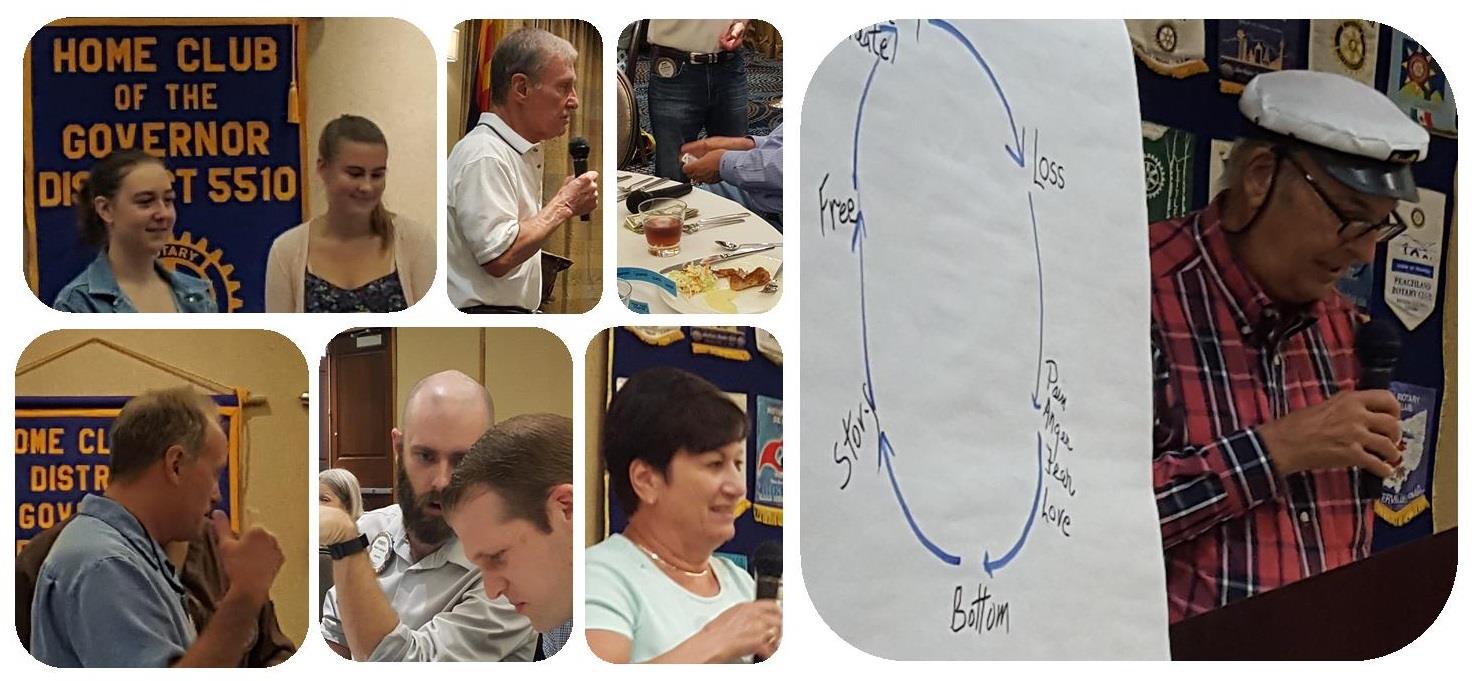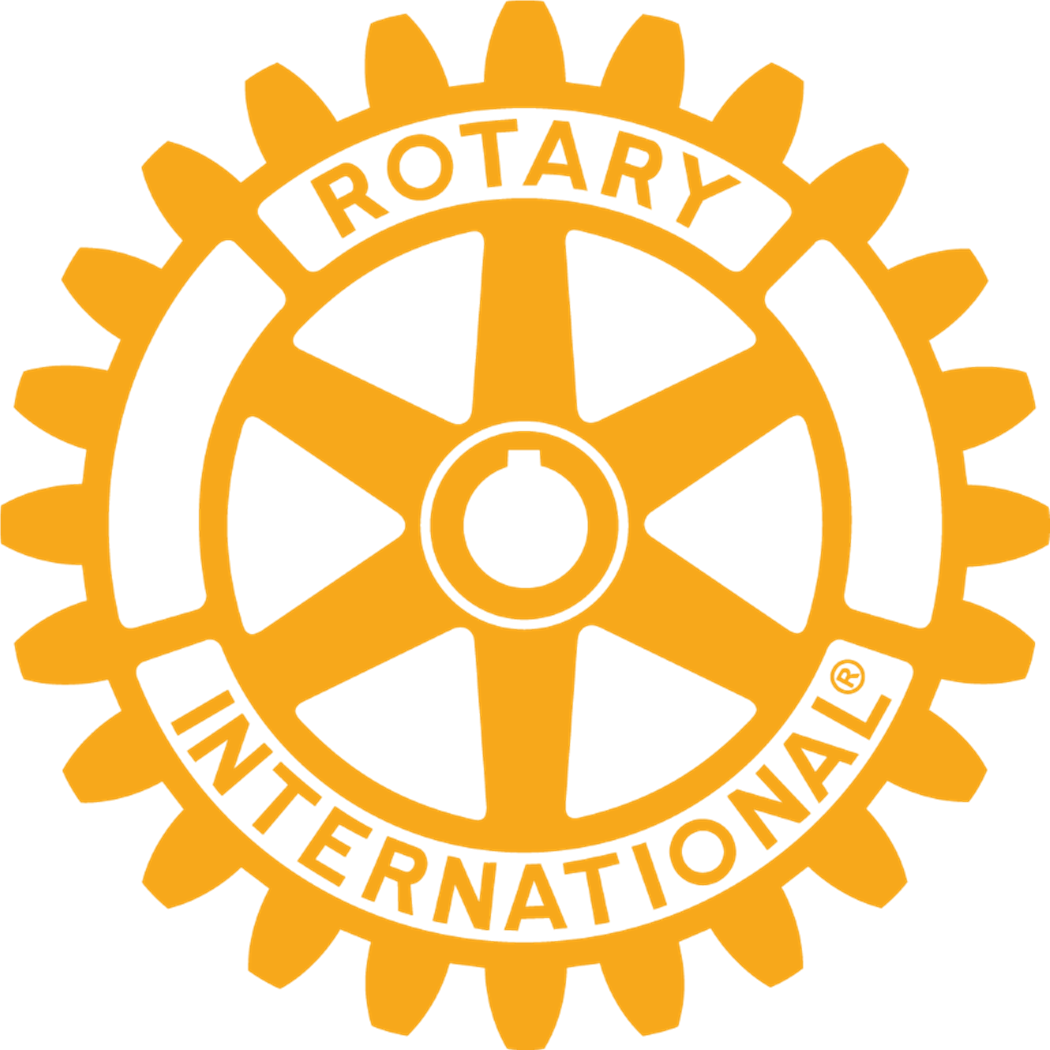 President Allan Cady invited Wendell Jones to lead members and guests singing four verses of "If You're Happy and You Know It..." Following this energizing activity, Dick Myren offered the invocation and Kurt Klingenberg led the Pledge of Allegiance.
President Allan Cady invited Wendell Jones to lead members and guests singing four verses of "If You're Happy and You Know It..." Following this energizing activity, Dick Myren offered the invocation and Kurt Klingenberg led the Pledge of Allegiance.There were several guests present: Phyllis Avalon Rosh, who accompanied our guest speaker to the meeting; Donna Goetzenberger's daughter, Paige, and Donna's daughter-for-a-year, Rotary Youth Exchange student, Lissa; Wendell Jones' beautiful wife, Carolyn; Wayne General introduced his guest, Lola McClane from Scottsdale; and Jack Rosenberg proudly introduced his granddaughter, Sammy
Badge number 27 was drawn in the attendance drawing, making Don LaBarge the lucky $5 winner. Chuck Flint announced that the weekly drawing winner would receive $61 and the chance to draw the ace of clubs to try to win $1,335. Allan Cady's ticket was drawn, but his luck did not hold out to win the large pot - he drew the nine of clubs.
Dr. Ron Thompson was called on to collect happy bucks. Jeanie Morgan paid happy dollars for the privilege of knowing Chuck Denney, an enthusiastic member of the Lake Havasu City Rotary Club, but sad to have learned that he passed away earlier in the week. She was also happy to discover that she had the capacity without investing in new software to create movies with still photos on her computer, and happier still that she wasn't too old to learn that new skill. Polly Schumacher paid happy dollars celebrating Jim Crutcher's presence at our meeting.
Polly was also happy that she was going to be able to see Mary Jo West inducted to the ARIZONA WOMEN’S HALL OF FAME. She was the first prime-time television anchorwoman in Arizona in 1976, thus opening the door for the women who followed her. She was also an anchor the pioneer CBS all night newscast, Nightwatch. She did not just stand in front of the camera, she worked on issues that were until then not in the forefront. She was the first woman to go-into the Arizona State Prison in Florence and interview inmates for her documentary on sexual assault, for which she won a Rocky Mountain Emmy. She has been a staunch supporter of mental health awareness throughout her professional career and private life, not only in Arizona but national as well. Polly says "Mary Jo is a remarkable person and continues to be involved in serving."
Jack Rosenberg was happy that the transmission that died in his car recently was still under warranty. Wayne General thanked the models for his recent photography at the Donor Appreciation Reception. He thanked Lucinda for her help getting them uploaded and Jeanie for her work putting them into a movie. Paige Goetzenberger was happy to be at our meeting and happy to be finalizing her application to be a Rotary Youth Exchange student. Chris Krueger was happy that Dr. Ron would be available to help her with a needed crown. Donna Goetzenberger sarcastically said she was happy Bryan had spent their wedding anniversary with Don LaBarge, but quickly admitted that she went to California with youth exchange students the weekend of their anniversary. Dan Coons paid happy dollars saying he caught several Rotarians doing good Rotary service-above-self stuff as he went about his business during the past week. Jim Crutcher was happy to be back. Robert LaBarge announced that he had recently signed on as a new hire in the school system in Pinion, Arizona. The student body at the school where he will be teaching is 98% Navajo. He plans to remain a member of our club and hopes to introduce Interact, RYLA, and Rotary community service to his students and his new community.
Announcements:
- Members were reminded of the Spring Olympics to be held Saturday evening, May 5, at the home of John and Jane Benedict.
- Members should mark their calendar for a June 16 event. The specific time and location will be announced later. We will not have a regular club meeting on Thursday, June 14.
- Colton Cagle, 20177-18 President of Westwood High School Interact has been elected Interact District Governor for 2018-19. He is involved with a mobility project in Africa and will be going on the trip to deliver all the devices that have been gathered. President Allan asked Rotarians to be prepared Thursday, May 10. At that meeting, we will be collecting " walking money" for Colton to take on his trip.
- Next week, we will have another in our series of business networking programs with Bryan Goetzenberger and Greg Okonowski presenting.
Lucinda General introduced guest speaker, David Rosh, who she and Wayne became acquainted with when they attended his 12-week Grief Recovery Program offered by Banner Hospice.
David said that in his past he has had several professions: Priest, teacher, social worker, psychotherapist, marriage counselor, and for the past eighteen years, has led the Grief Recovery Program for Banner. He said that he never dreamed of spending that many years of his life dealing with grief, but after he discovered the program that enables people to find a natural pathway to connect following significant emotional loss. He discovered the program in West Hollywood, California and asked that we not discount its value because of that fact. It is a 12-week highly structured program.
After a significant emotional loss, which is defined for this purpose, as the end or change to any familiar pattern of behaviors. Death of a loved one, divorce, job loss, relocation, can all cause grief. With such a loss, it is a common experience to have a loss of "person powers." This can be evidenced by reduced ability to concentrate, change in eating or sleeping habits, emotional isolation, and many other similar manifestations.
It is a Medicare requirement for all hospices, whether for-profit or non-profit, to offer grief support services. The intention of the Grief Receover program is to convert pain to liberation and empowerment. Each 12-week program is open to new people during the first four weeks, but the group then becomes closed during the final eight weeks.
David used a visual aid, drawing an illustration on a flip chart as he spoke. The first stopping point in his illustration was birth - each of our first experience with significant emotional loss when we got kicked out of the security and safety of the womb. We instinctively knew how to express what we were feeling - pain, anger, fear, and love. We had sounds for these feelings that were communicated pretty clearly even though we did not have words.
In our environment, whether in our homes or our social experiences, we learned that some of those expressions of natural emotions should be squelched in order to meet our environmental social norms. It is important to get past those societal inhibitions and be able to tell our story. He gave some illustrations of things that are commonly said to those who are grieving which may be intellectually accurate, but touch the heart of the person who is grieving in a hurtful way. He said there is about 14-18" between our head and our heart, and that we should speak from our hearts when dealing with someone who has had a recent loss. For instance, we wouldn't tell someone who had lost a leg, that it would be okay because they had another one. Why, then, would we tell someone who had lost a child that they are lucky to still have another one. The pain of grief is intensified when a person is made to feel that the expression of their pain is not normal. Pain not expressed is energy bursting to get out. It is ignored at risk of great peril.
Grief is emotional. It is not intellectual. Grief is feeling. Grief is energy. It has to be allowed to surface and be honored.
At some point, those in grief "hit bottom" and if they are lucky and find a program like the one he works with, they find the opportunity to tell their story. The freedom to express themselves in a supportive environment is empowering. Through that freedom, they can regain their ability, which is uniquely human, to be creative and through that creativity, they can again find joy. They can find the ability to own and operate themselves again.
David ended by telling of a dream where "In my heart, in a white chamber, I saw golden bees making sweet honey from my past pain."
Those who are interested in joining a Grief Recovery Program can contact Banner Hospice, Bereavement Supervisor, at 480 657-1167.
Before everyone left, John Benedict reminded everyone about Spring Olympics, Saturday, May 5, at his house.

